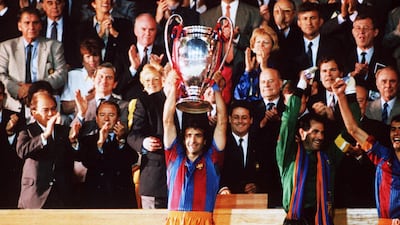Barcelona’s players were preparing to walk on to the Wembley pitch when coach Johan Cruyff held them back for a final word.
“We are in Wembley,” he said, “The pitch is perfect, the stadium is full. We are going to play in the final of the European Cup. So go out and enjoy it.”
One of the three biggest clubs in world football, it took Barcelona until 1992 to win their first European Cup. The Catalans had reached the final before on four occasions, losing all. They had also lost the previous year’s Cup Winners’ Cup final to Manchester United.
Against the Italians Sampdoria, playing in their first final, Barca were favourites. Their hotheaded striker Hristo Stoichkov was idolised just like Sampdoria’s Gianluca Vialli.
Barcelona and Sampdoria had met in another final - the 1989 European Cup Winners’ Cup.
"We won 2-0 in Basel, where Barca had won their only another European Cup Winners' Cup 10 years earlier," Barca's then midfielder Eusebio recalled in an interview with The Athletic. "'89 was significant for us. Sampdoria were the top Italian team. They had Vialli, Mancini, the goalkeeper Pagliuca and a Spaniard Victor Munoz. By 1992 they also had Attilio Lombardo."
Sampdoria were desperate to avenge ’89 – a game Vialli missed through injury – and had improved to become Serie A winners for the first time. They had also won the Cup Winners’ Cup in 1990.
The 1991/92 European Cup was the first to have a group stage with the eight second-round winners split into two groups and also the last one before the competition was rebranded as the Champions League.
Barcelona won their group consisting of Sparta Prague, Benfica and Dynamo Kiev; Sampdoria won three of their six group games to finish ahead of holders Red Star Belgrade, Anderlecht and Panathinakos. Red Star were not allowed to play at their home ground because of the war in Yugoslavia.
It was the first time that an English club was allowed back into the competition after the ban following the Heysel disaster, but Arsenal were knocked out by Benfica and didn’t make the group stage. French champions Marseille, who would win the competition in 1993, were also knocked out before the group stage, as were German champions Kaiserslautern.
Now a third division side, Kaiserslautern lost 2-0 in the second round against Barca before surging into a 3-0 lead in the return leg. Battered Barca were heading out of the competition but with seconds left Jose Mari Bakero headed in the crucial away goal from a Ronald Koeman free-kick.
“Kaiserslautern could have scored six or seven,” admitted a young Pep Guardiola. “We literally didn’t have a shot in the whole game and even after Bakero’s goal [Andoni] Zubizarreta had to make two more saves. I remember Zubi saying in the dressing room, 'after winning tonight we’re destined to win the European Cup'.”
At Wembley, they just had Sampdoria to beat. The Barca team sheet read: Zubizarreta, Koeman, Ferrer, Nando, Guardiola, Eusebio, Juan Carlos, Bakero, Laudrup, Stoichkov and Salinas. Sampdoria, coached by the Serb Vujadin Boskov, started with Pagliuca, Mannini, Vierchowod, Lanna, Katanec, Lombardo, Pari, Cerezo, Bonetti, Mancini and Vialli.
Vialli thought he had scored in the 69th minute but his chip went the wrong side of the far post. Stoichkov was always a threat and hit the post with a shot. Barca, still haunted by their 1986 European Cup final defeat to a Steaua Bucharest side who had played for penalties, attacked. A Cruyff team wouldn’t have settled for less and he had promised ‘celebrating all that is best in football’ before the game. The vengeful team from Genoa were worthy foes, with Lombardo the best player on the pitch.
The game went to extra time on the vast, sapping Wembley surface. With a crowd of 70,827, the stadium wasn’t even full, with 30,000 Barca fans in the stadium and the same from Italy.
The breakthrough came after 112 minutes when Koeman struck a free kick over the wall. The Dutchman hit it with accuracy and power to score the most famous Barca goal in their history. The Wembley goal which he nearly broke was later bought by Barca for their club museum.
Koeman was mobbed by his teammates.
“When we scored that goal, all I remember thinking was please, please Barca don’t lose your mind,” said Cruyff. “I knew that if my players hung on to their minds we would win.”
______________________
The long read: how player power and politics made for a perfect storm at Barcelona
______________________
Barca fans celebrated in central London, future club president, Joan Laporta, even jumped into the River Thames – as he’d promised to do if Barca won. Over a million fans greeted the team back in Catalonia.
"Visca el Barca, Visca Catalunya!" roared Jordi Pujol, the president of Catalonia. Pep Guardiola's reaction will never be forgotten as he paraphrased the "Citizens of Catalonia, I am here!" words of Josep Tarradellas on his return from exile after General Franco's death.
“Citizens of Catalonia, you have it here!” said Guardiola.
But Barca could not rest on their laurels. The Spanish season was still underway, with the Catalans a point behind Real Madrid, who had a superior goal difference.
It was time for another Cruyff pep talk. He sat his players down and said: “We’re European champions, now’s the time to go and win the league too. I need people who are prepared to give everything.”
They did, winning their last three matches 6-0, 4-0 and 2-0 to grab the league title on goal difference.
Despite that feat, Barca’s ’92 team will be best remembered for what they achieved at Wembley – and in the summer the city hosted the Olympics too.








